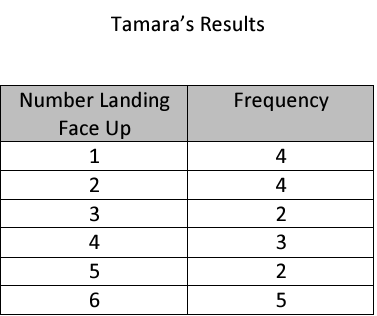DOUBLE POINT QUESTION!
True or False:
Experimental probability is what is expected to happen.
False
2x+1=5
x=2
x+2<-3
x<-5
Simplify:
3(x+2)
3x + 6
Evaluate
3+5(4+6^2)
203
What is the theoretical probability of rolling a number greater than 4 on a 6-sided number cube (dice)?
2/6=1/3
-6+3x=12
x=6
-4+x>=10
x>=14
Simplify
-4 (m + 9)
-4m - 36
Evaluate
9+(1+1*7)-2
15
Max has eight circular chips that are all the same size and shape in a bag. Max reaches into the bag and removes one circular chip. What is the theoretical probability that the circular chip has a star on it?

5/8
x/-2+1=7
x=-12
8x>16
x>2
Simplify:
3x - 9x
-6x
DOUBLE POINT QUESTION!
Evaluate when a=2, b=-1
2a+3b
1
Tamara rolled a fair number cube with sides labeled 1, 2, 3, 4, 5, and 6. The table shows the results of rolling the fair number cube 20 times. Determine the experimental probability that the number landing face up is a five.

2/20=1/10
(x-4)/3=-2
x=-2
x/4<=-3
x<=-12
Simplify:
9 + 7x - 11 - 12x
-5x - 2
Evaluate when x=-2, y=4
3x-5+2y
-3
A bag contained one red, one blue, and one green ball. Each ball in the bag is the same size and shape. Mr. Smith selected a ball from the bag without looking, recorded the color, and returned the ball to the bag. He did this four times, and the results were red, green, blue, green. Determine the experimental probability of Mr. Smith selecting a red ball from the bag.
1/4
-2(x-5)=8
x=1
-5x<20
x> -4
DOUBLE POINT QUESTION!
Simplify:
15+3(x+1)-4x
18-x
Evaluate when
x=-1, y=2, z=0
-x+2y-5+z
0